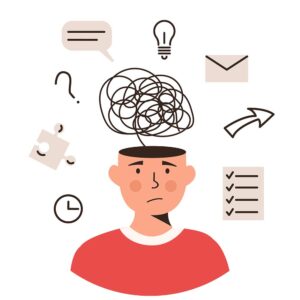There is a lot of confusion about the differences and similarities between ADHD and autism. Many people think that they are one and the same thing, but this could not be further from the truth. In this blog post, we will discuss some of the key similarities and differences between these two conditions. We will also look at how they are treated, and what steps can be taken to help those who suffer from them.
Contents
What Is ADHD?
 ADHD refers to Attention Deficit Hyperactivity Disorder. It is a neurodevelopmental disorder that is characterized by problems with focus, hyperactivity, and impulsiveness. This condition is often first diagnosed in childhood, but it can carry on into adulthood. For example, an adult with ADHD may have trouble keeping a job or maintaining relationships.
ADHD refers to Attention Deficit Hyperactivity Disorder. It is a neurodevelopmental disorder that is characterized by problems with focus, hyperactivity, and impulsiveness. This condition is often first diagnosed in childhood, but it can carry on into adulthood. For example, an adult with ADHD may have trouble keeping a job or maintaining relationships.
More often studies have found that there is a higher prevalence of ADHD in males than females by about four to one. Symptoms of ADHD can vary depending on the individual, but they typically fall into three categories: inattention, hyperactivity, and impulsiveness.
What Is Autism?
Autism is a neurodevelopmental disorder that is characterized by difficulties with social interaction, communication, and repetitive behaviors. It is believed that autism typically begins during infancy or early childhood and can cause significant impairments in an individual’s functioning.
For example, a person with autism may have difficulty with eye contact, facial expressions, and body language. They may also have trouble understanding and responding to other people’s emotions. Additionally, people with autism may engage in repetitive behaviors such as hand-flapping or spinning. They do this because it helps to soothe them and provide a sense of comfort.
How ADHD And Autism Are Related?
 As we are now aware of these two disorders, it is important to understand how they are related. Both ADHD and autism share some common symptoms and differences too. It is believed that both these disorders have a genetic basis. So, if you have a family member with autism, you are at an increased risk of developing ADHD.
As we are now aware of these two disorders, it is important to understand how they are related. Both ADHD and autism share some common symptoms and differences too. It is believed that both these disorders have a genetic basis. So, if you have a family member with autism, you are at an increased risk of developing ADHD.
Both these disorders can cause problems in your overall quality of life. Let’s further deal with the similarities and differences between ADHD and autism.
Similarities
There are various similarities between ADHD and Autism due to which they are often confused with each other. Some of the similarities are listed below:
- Both these disorders can cause problems with social skills
- People with both ADHD and autism may have a hard time making friends
- They may also face difficulty in maintaining eye contact
- People suffering from both these disorders may be unable to follow conversations
- Both disorders cause problems with fine and gross motor skills
Along with these similar things, there are some common signs that both ADHD and autism share, such as:
- Both these disorders can cause problems with sleep
- They may also suffer from anxiety and depression
- People with both ADHD and autism may have a hard time focusing on tasks
- Difficulty in completing tasks is another common symptom
- People with ADHD and autism may also suffer from Sensory processing disorder
Now that we have looked into the similarities between ADHD and Autism, let us see how they differ from each other.
Differences
ADHD and autism, despite having some similarities, are two distinct disorders. Some of the key differences between the two are listed below:
- Autism is a developmental disorder that is characterized by social impairments, communication difficulties, and restricted and repetitive behaviors. ADHD, on the other hand, is a neurobehavioral disorder that is characterized by problems with impulsivity, hyperactivity, and attention.
- Most children with autism are diagnosed before the age of three, while most children with ADHD are not diagnosed until they are school-aged.
- The causes of autism are unknown, but it is believed to be caused by a combination of genetic and environmental factors. On the other hand, ADHD is caused by exposure to toxins, brain injury or premature birth, etc.
- Also, children with ADHD have difficulty concentrating on work for a long time. But children with autism are described as having a limited scope of interest. They seem to have an obsession with the things which they enjoy doing.
So these are some differences that exist between ADHD and autism. And also some similarities that are discussed above. It is important to be aware of both the similarities and differences in order to provide the best possible support for children with either disorder.
Moreover, you should also keep in mind that each child is unique and may exhibit different symptoms than what is typically seen in either disorder. If you have any concerns about your child, be sure to speak with a healthcare professional.
Can ADHD Be Mistaken For Autism?
 It is not uncommon for children with ADHD to be misdiagnosed as autistic. This is because there are many similarities between the two disorders. Both ADHD and autism can cause problems with focus, concentration, and social interaction. There are several theories as to why this misdiagnosis occurs, but one is that both disorders share some of the same genetic risk factors.
It is not uncommon for children with ADHD to be misdiagnosed as autistic. This is because there are many similarities between the two disorders. Both ADHD and autism can cause problems with focus, concentration, and social interaction. There are several theories as to why this misdiagnosis occurs, but one is that both disorders share some of the same genetic risk factors.
While there are similarities between ADHD and autism, there are also some important differences. One key difference is that children with ADHD do not have the same kinds of social deficits as those with autism. In fact, many children with ADHD are quite social. They may just have trouble paying attention or following rules.
Additionally, children with ADHD are more likely to have problems with impulsivity and hyperactivity than those with autism. According to studies, ADHD is present in about 60% of children with autism, while impulsivity and hyperactivity are only present in about 30% of those with autism.
So, what does this all mean? It means that if your child is showing signs of ADHD or autism, it is important to get them evaluated by a professional. Only a trained expert can give you a definitive diagnosis. But, if your child does have ADHD or autism, know that you are not alone. There are many resources and support groups available to help you and your family.
How To Diagnose It?
The diagnosis of ADHD and Autism is made by a professional—usually a developmental pediatrician, child psychiatrist, or child psychologist—after a comprehensive evaluation. The process includes taking into account medical, developmental, educational, and behavioral information.
A diagnosis is also based on how well the individual functions in different settings (e.g., at home, school, and work). There is no single medical or genetic test for either ADHD or Autism.
Because there is often considerable overlap in symptoms, it can be difficult to diagnose one condition without also considering the other. For example, both ADHD and Autism can cause problems with social skills, impulsivity, and repetitive behaviors.
It is important to note that ADHD and autism are not the same conditions, and they require different interventions and support. However, because of the similarities in symptoms, it is often difficult to distinguish between the two conditions. If you think your child may have either ADHD or Autism, it is important to seek out a professional evaluation.
The best way to diagnose ADHD and Autism is by consulting with a professional who can administer different tests and ask questions about the individual’s behavior. Therefore, do not delay in seeking an evaluation if you think your child may have either of these conditions. Early intervention is key to helping individuals with ADHD and Autism reach their full potential.
How To Manage ADHD And Autism?
 There is no one-size-fits-all answer to this question, as each individual with ADHD or autism is unique and will require a different approach. However, there are some general tips that may help:
There is no one-size-fits-all answer to this question, as each individual with ADHD or autism is unique and will require a different approach. However, there are some general tips that may help:
Create a routine and stick to it
This is important for both children and adults with ADHD or autism. Having a set routine can help to reduce anxiety and provide a sense of structure and predictability. For example, you may want to create a daily schedule that includes time for school or work, leisure activities, and relaxation. It will more likely help if you make the schedule visual, using pictures or symbols.
Be flexible
While routines are important, it is also important to be flexible and willing to adjust the routine as needed. For instance, you may need to allow extra time for certain activities or break tasks down into smaller steps. Because it is not always possible to stick to the schedule perfectly, it is important to be prepared to make changes when necessary.
Build in breaks
Both children and adults with ADHD or autism can become overwhelmed by too much stimulation. It is therefore important to build in regular breaks throughout the day. This can involve taking a few minutes to step away from a task or activity or taking a short nap or relaxation break.
Encourage physical activity
Physical activity can help to reduce symptoms of ADHD and autism, as well as improve overall health and well-being. It is important to find an activity that the individual enjoys and that is not too stimulating. For example, walking, swimming, or yoga may be suitable options. When you are active, your brain releases chemicals called endorphins, which have mood-boosting effects.
Eat a healthy diet
What we eat can have a big impact on our symptoms and overall health. Eating a balanced diet that includes plenty of fruits, vegetables, whole grains, and lean protein can help to improve concentration, energy levels, and mood. It is also important to limit sugary and processed foods, as well as caffeine.
Get enough sleep
Sleep is essential for our physical and mental health. However, individuals with ADHD or autism may have difficulty falling asleep or staying asleep through the night. It is therefore important to establish a regular sleep routine and create an environment that is conducive to sleep. Because our bodies need around eight hours of sleep per night, it is important to make sure that we are getting enough rest.
Make time for your enjoyment
Both children and adults with ADHD or autism may benefit from having some downtime each day to do something they enjoy, such as reading, playing a musical instrument, or spending time with a pet. This can help to relieve stress and improve overall mood and focus. Also, when you choose to make time for yourself it directly impacts your ability to be more patient, present, and understanding with your loved ones who have ADHD or autism.
Seek professional help
 It is important to seek professional help if you think you or your child may have ADHD or autism. A diagnosis can be difficult to obtain, but it is important to get an accurate one so that you can get the appropriate treatment. There are some common therapies that help with both conditions, these include:
It is important to seek professional help if you think you or your child may have ADHD or autism. A diagnosis can be difficult to obtain, but it is important to get an accurate one so that you can get the appropriate treatment. There are some common therapies that help with both conditions, these include:
- Behavioral therapy
- ABA therapy
- Cognitive behavioral therapy
- Family therapy
- Medication
These are some of the common therapies that help with both conditions, but each individual is different and will respond to different treatments in different ways. It is important to work with a professional who can help you figure out what will work best for you or your child.
Overall these tips should give you a general idea of what to expect when it comes to ADHD and autism. It is important to remember that each individual is different, so not everything will apply to everyone. If you or your child are struggling with either condition, seek professional help so that you can get the appropriate treatment.
Conclusion
To conclude ADHD and autism are both disorders that have many similarities, but also a few key differences. Both can cause problems in social situations, and both can make it difficult to concentrate on tasks. However, autism is more likely to cause problems with communication and interaction, while ADHD is more likely to cause problems with impulsiveness and hyperactivity.
It’s important to remember that every individual with either disorder is unique, and will therefore experience symptoms in their own way. If you think your child may be displaying signs of either ADHD or autism, it’s important to speak to a healthcare professional for a diagnosis. With the right support and intervention, both disorders can be managed effectively.
For more information and tips you can contact Therapy Mantra. We have a team of professional therapists who can provide you with the support and guidance you need to recover from this condition. Contact us today to learn more about our services. You can also book an online therapy session or download our free Android or iOS app.


